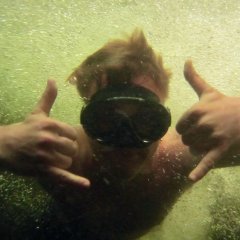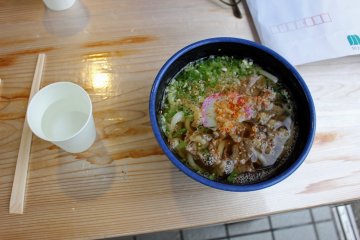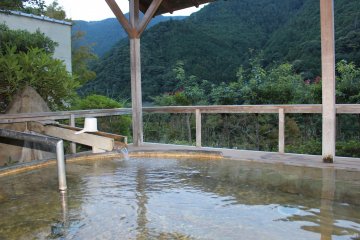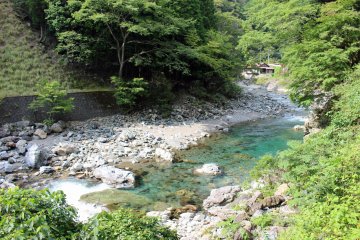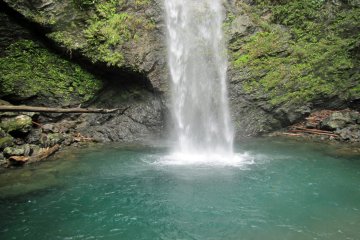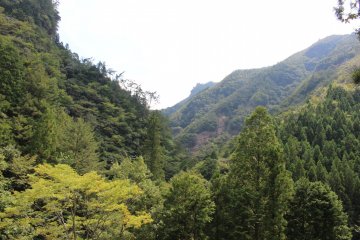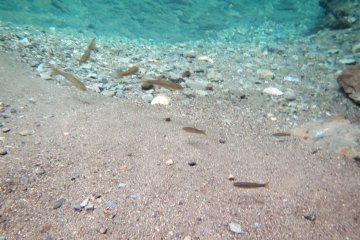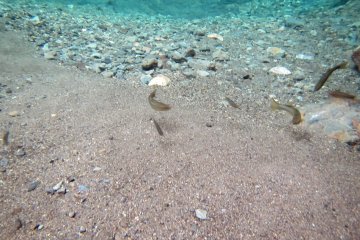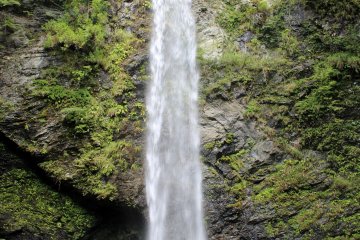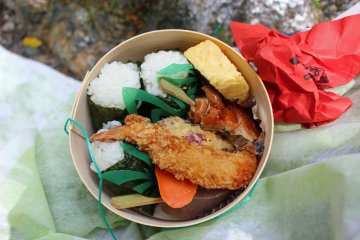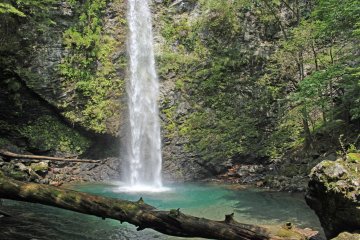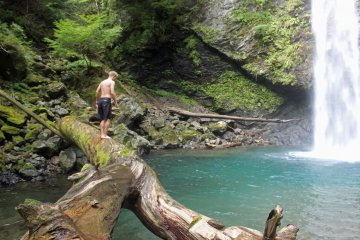I skipped a rock across the length of a small pool. My success inspired my tour guide to do the same. He did not have the same success I did and his rock plunked straight to the bottom of the pool near the water's edge. Instantly a small school of fish gathered in the water near where we stood.
“Look at all the Takahaya!” said my guide. He picked up a pebble and dropped it into the middle of the school. The splash and the sinking pebble excited the gathered fish to search the area for food and attracted more fish from elsewhere in the pool. The fish were so intent on their hunt, or so unafraid of people, that my lowering my underwater camera into the pool didn’t faze them. A few more dropped pebbles later and I had some truly great shots.
Kawakami-mura
Kawakami-mura in the mountains of southern Nara Prefecture is a place that’s really out in nature. Ten kilometers of road separates the northern boundary of Kawakami-mura from the nearest train station, the only way in without a car is by bus (cutting down the amount of people to contend with). The many small mountain hamlets and villages of Kawakami-mura are strung along the main road, National Route 169, the rest of the area is mile after square mile of mountains, forests and clear blue rivers. One of the best ways to get out into that unsullied nature is to go on the Suigenchi no Mori, or Riverhead Forest, hiking tour put on by the Genryukan Museum.
Hiking with the Genryukan Museum
The Riverhead Forest Tour costs ¥4,000/adult or ¥2,600/child and includes van transportion to and from the hiking area, a lunch bento, and a guide (who spoke a little bit of English) who will conduct the tour using nature as a textbook. Even the drive to the trailhead is a joy. The road crosses the Osako Dam and winds along the banks of the Osako Reservoir and up the narrow canyons of two mountain rivers allowing many opportunities to take in and photograph the scenery.
Once at the trailhead, the guide will lead you along an easy trail through sustainably farmed cedar plantations, primeval forests and along the headwaters of the Yoshino River. The guide showed me many edible, medicinal and poisonous plants along the way and informed of their significance in folklore and the cultural functions they served.
The highlight of the hike for me was the Myojin no Taki waterfall at the end of the trail deep in the woods. The water of a small creek plunged close to 100 feet over a cliff into a pool of the clearest blue water. A fallen tree over the outlet of the pool, within jumping distance of deep water, provided the perfect diving platform. Not to go for a swim would be sacrilege. There is no better alternative for beating the heat, and after a hike taking a dip in the fresh clear mountain water was a welcome relief and a great way to regenerate. Picnicking in view of the falls and having its negative ion-powered spray and accompanying breeze keep the September sun at bay was a wonderful way to enjoy lunch.
Getting there
Kawakami-mura and the Genryu no Mori Hike are best accessed by car. By train, take the Kintetsu Yoshino Line to Yamato Kamiichi Station and transfer to a Nara Kotsu bus bound for Yusakari Onsen-Sugi no Yu (湯盛温-杉の湯) and ride all the way to the terminus (bus fare: ¥950). The Genryukan, the starting point for the hiking tour is a 5-minute walk from the bus terminal. An advanced reservation is required! Hot springs, food and accommodations are available at and around the Sugi no Yu Hotel and bus terminal allowing you to relax, rest and reflect upon your time in the wilds of Kawakami-mura.


